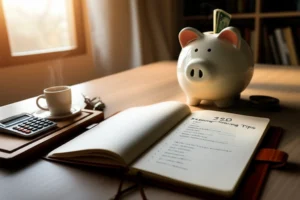So, you’re wondering what a frugal lifestyle really looks like? Spoiler: it’s not about living in a box wearing old T-shirts (well, not all the time). It’s more like a mindset—a way of making your money work smarter rather than harder. Maybe you’ve heard people say frugality feels like deprivation, but honestly, it’s often the opposite. It’s about freeing yourself from financial worry by focusing on what matters most to you—and keeping the rest in check.
Think of it like this: frugal living is more like crafting a cozy nest with the basics done right, rather than hoarding shiny things you don’t really need. And the cool part? It looks different for everyone. So if you’re new here, consider this your friendly guide—no lectures, no fancy rules, just some down-to-earth ideas on how to save a little, stretch your dollars, and maybe feel a bit lighter along the way.
Why Choose Frugality?
Is It All Just Cutting Corners?
Not at all. See, frugality isn’t about pinching pennies until you’ve squeezed all the life out of them. It’s about choosing carefully, spending intentionally, and skipping the stuff that doesn’t add real value. When you do this, extra cash appears—and suddenly, you’re not just surviving, but planning ahead: paying off debts, saving for fun things, or even retiring early.
Have you ever noticed how spending less actually feels like gaining more? That extra dough in your pocket isn’t just money—it’s options and peace of mind. A Reddit thread I came across recently had people sharing how this lifestyle helped reduce anxiety and means they sleep better at night, knowing they’ve got control over their money, not the other way around.
Finding Joy Beyond Dollars
Here’s something that might surprise you: frugal living often brings more joy. Yep, true happiness isn’t buried in sales racks or fancy gadgets. Many find that focusing on simple pleasures—cooking with family, walks, good books—adds more sparkle than a credit card splash ever could.
Instead of chasing momentary thrills, frugal living nudges you toward experiences and things that last longer, emotionally and financially. And when you think about it, isn’t that what we really want?
Small Shifts, Big Savings
Smart Kitchen Moves
Let’s talk food because, yes, I’ve burned that midnight ramen more times than I care to admit… but frugality changed that. Instead of last-minute takeout, imagine batch cooking on a weekend afternoon—making enough for the whole week, then freezing meals in portions.
Not only does this save money by buying in bulk and avoiding takeout, but it saves mental energy on tired nights. Batch cooking is one of my secret weapons to a less chaotic life. It’s a tip I spotted in The Cheapskate Guide and swear by. Batching errands works the same way—you run all your shopping in one go, saving gas and time, instead of a dozen mini-trips that add up.
Now, if you’re feeling adventurous, here’s a mini table with some easy, budget-friendly meal ideas that keep me going:
| Meal Idea | Cost Savings | Why It Works |
|---|---|---|
| Veggie Stir-Fry from Pantry Odds | $5/week | Uses up leftovers, reduces food waste |
| Bulk Bean Soups | $20/month | Freezes well and is hearty |
| Homegrown Herbs (if possible) | $10/season | Fresh flavor without extra store runs |
Oh—and if you love kitchen hacks like these, you can find tons of Frugal habits to save money that make the whole process smoother without pain.
Clothes That Last
Ok, confession time: I used to buy clothes on impulse (and yes, those impulse buys mostly stayed in the back of the closet). Now, I’m all about quality over quantity—which means fewer pieces, but ones that really go the distance.
Think sturdy jeans, versatile jackets, and shoes that don’t fall apart in a month. This idea comes straight from some smart advice shared by Synchrony, where investing a bit more upfront saves you tons down the line, avoiding the “throwaway” mindset.
Here’s a quick rundown on thrift vs. new, because you’re probably wondering:
- Thrift Find: $10 jeans, solid and worn-in for years.
- Brand New: $50 trendy pair, lasts maybe one season.
- DIY Fix: Patching holes or hemming for free versus $20 dry cleaning.
By the way, if you’re curious about some clever Unusual frugal tips for your wardrobe, there are plenty of creative ideas waiting for you out there.
Anecdote
My friend once thrifted a full outfit for a job interview… and got the job! Kind of proving you don’t need to spend a fortune to make a great first impression.
Living Spaces and Lifestyle
Can Smaller Homes Feel Cozy?
Here’s a question: do you really need all that space? Leo Babauta’s guide to frugal living makes a killer argument for downsizing—one car for the family, smaller homes, skipping the SUV. The fewer square feet to heat or cool means more money in your wallet.
Plus, a tidier space can mean a tidier mind. Decluttering regularly is a classic what is a frugal habit? that helps you avoid buying duplicates and makes day-to-day life simpler.
Frugal Doesn’t Mean No Fun
One big myth? That frugal living = boring. Not true. You’d be surprised how many fun things are actually free or low cost. Like taking advantage of local libraries, community events, or traveling off-season when prices drop (that saved me a small fortune last summer).
Resourceful moves, like hunting for coupons or DIY gifts, make space in your budget for memories instead of clutter. NerdWallet calls frugal living “resourceful” which sounds way cooler than just being cheap, right?
Budget-Friendly Fun Ideas
- Park picnics: fresh air, good company, zero cost.
- Library swaps: books, magazines, even tools without buying new.
- Local free classes or workshops: learn skills and meet people without busting your budget.
Wondering how to avoid mistakes? Learn from others with What are common frugal living mistakes?. And if you’re starting out, get clear on What is a frugal habit? that suits your personality.
Big Picture: Mindset and Money
Building Real Wealth
Here’s the thing—frugal living isn’t about just saving every penny until you feel miserable. It’s about building wealth slowly and surely. Reddit users talk about retiring early by investing the money they saved by choosing frugal habits. The Financial Poise team even says it’s about creating a “richer life,” not just richer bank accounts.
So it’s both about being thoughtful with your money and about rethinking what being “rich” really means. Sometimes it’s about the freedom to say “yes” to experiences or “no” to stuff that doesn’t matter.
Track It Without Stress
If budgeting feels scary, start small. Use simple methods like the cash envelope system, where you physically allocate money each month for food, fun, and other categories. It might sound old school, but it works wonders to keep spending in check without feeling like a prison.
This method also helps in spotting patterns and keeping your goals front and center. If you want to dive into different budgeting styles, here’s a neat chart to get you thinking:
| Budget Type | Description | Best For |
|---|---|---|
| Zero-based budget | Plan every dollar ahead, down to the last cent | Detail lovers who want control |
| 50/30/20 budget | Divide income into needs (50%), wants (30%), savings (20%) | Those wanting flexibility |
| Cash envelopes | Use cash for categories to curb overspending | Anyone tired of maxing cards |
Dipping your toes in with Frugal habits to save money can make the process feel manageable, even fun, instead of a chore.
Wrapping It Up
So, what does a frugal lifestyle look like for you? It might look like cozy meals cooked ahead, a smaller, simpler home that feels like a hug, or investing in fewer but better-quality things. It’s a set of habits that add up to more choices and less stress, a way of finding joy in the basics instead of chasing the latest gadgets.
Starting doesn’t have to be complicated. Maybe today you try a batch-cooking experiment, or take a look at your closet and think about repairs instead of replacements. Maybe you give your wallet some breathing room by budgeting with envelopes or go for a free local event instead of a night out.
Remember, this isn’t about being perfect. If you want a shortcut, start by learning what is a frugal habit? that fits you and skip what are common frugal living mistakes? others have made. The little wins stack up faster than you think.
What’s one small tweak you’ll try today to see if a frugal lifestyle could work for you? Drop a note below—I’m rooting for you!













